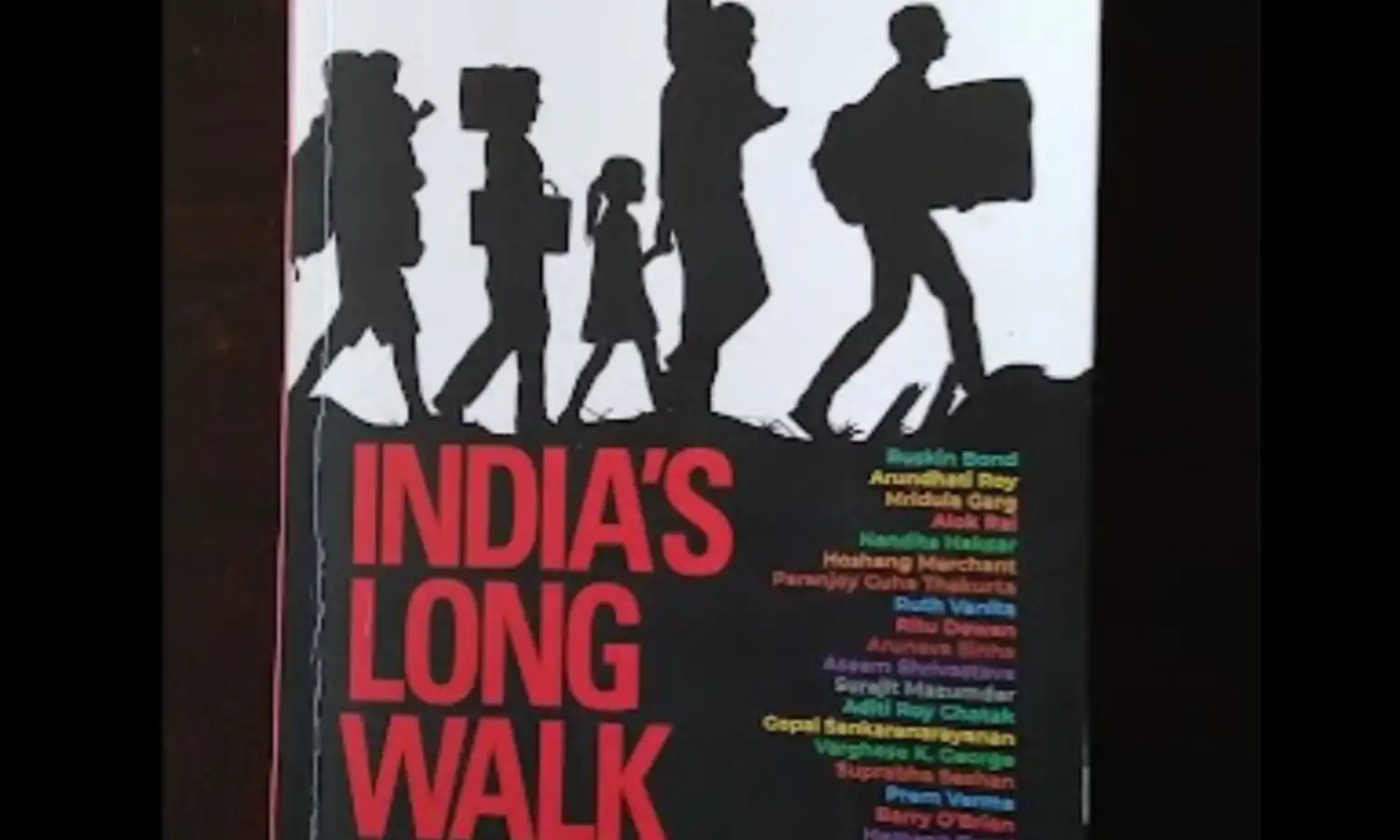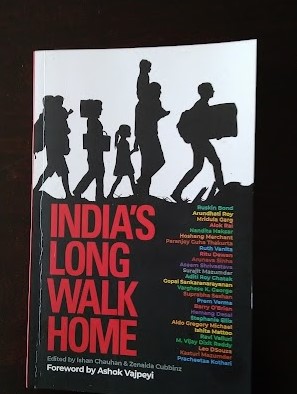Indeed a Long Long Walk Home
Book review

About once in every generation an event occurs which is so tectonic in its scope and intensity that it cries out to be chronicled for posterity. Not merely recorded or reported by news media and television channels, for that is merely transient journalism conveying statistics, allegations and denials. It does not convey the pathos and sufferings of millions, the shattering of dreams and lives; it concerns itself with the body and not the soul. Journalism is an inadequate testament for such events. These tragedies have to be narrated from the heart, not the brain; with feeling, not just analysis; with a sense of regret, not just urgency; with outrage, not just objective acceptance.
INDIA'S LONG WALK BACK HOME is a much needed, valiant attempt to do just that. The book is a sensitively curated anthology of poems, essays and articles about the largest and most draconian lockdown in the world enforced by the government in India in March 2020, following the outbreak of Covid 19. Its focus is the biggest migration of peoples since the partition of 1947. Divided into three sections- Fiction, Non-Fiction and Poetry- it has contributions by Ruskin Bond, Arundhati Roy, Mridula Garg, George K Verghese, Paranjoy Guha Thakurta,, Gopal Sankaranarayanan, Suprabha Seshan, Ashok Vajpeyi, among others.
The book addresses two broad issues- the degradation of the environment and the impact of Covid on the people of the country, in particular the vulnerable sections. It does so with scholarship, personal experience, feeling and satire.
Zenaida Cubbinz's End of the Road mirrors a typical, heart-rending migrant experience: the story of a young couple, with two children, walking back to their village hundreds of miles away. They leave their dignity along with their employment back in the metropolis which does not want them any more. On their long walk back home they are stripped of whatever little remains- food, water, money, shelter, and finally, even the will to continue. They hang themselves on a tree, mere desiderata from the modern, muscular India our rulers aspire to, pictured ( in her patented style) by Arundhati Roy in And The President Took The Salute.
Kasturi Mazumder's Butterfly is the story of another migrant family, through the eyes of a young boy, a luckier one because two of them live to tell the tale. But it asks the question which no economist or Prime Minister wants to answer: " Does money really decide who gets to have shades over their heads in such heat ? Does it decide how much water one gets to drink or the amount of food they have in their share ?" It does, but luckily the boy doesn't know it yet.
Alok Rai's How India Is Outsourcing The Pandemic To Its Poor is a scathing denunciation of the rampant inequalities- social, economic, health, demographics- in India, and how the govt's Covid policies only reflect this. The poor and marginalised have had to bear the brunt of not only the virus but also of these incoherent policies which are " a virus-inflicted replication of our socio-economic apartheid." Covid has provided a brutal govt. and an unjust society the ultimate outsourcing opportunity: " farm out the dying as well" to the poor.
Ritu Dewan offers a new perspective in Gender Blind Pandemic Response where she rues the fact that the pandemic and the govt's response have only reinforced patriarchal structures at several levels. The status of the migrant- a much used but little understood term- is examined in depth in Nandita Haksar's The Migrant As A Citizen from all angles- demographic, legal, social, human rights. The essay reinforces Alok Rai's point about inequality in that whereas the govt. has some policies in place for our 30 million " international" migrants, there is no such policy for the 120 million internal migrants.
In Parallels From The Past: Why We Should Hang Our Heads In Shame, Paranjoy Guha Thakurta, in his usual, unsparing style, compares aspects of this pandemic with the great Bengal famine of 1943, and the similar duplicitous responses of the two govts.- concealing the number of actual deaths, refusal to provide genuine relief to the affected, skewing assistance in favour of the better-off sections of society, ruthlessly suppressing journalists who tried to reveal the truth. He does not hesitate to castigate the judiciary for failing to provide any protection to newspersons and migrant poor.
The reader's growing despair and anger are somewhat relieved by the refreshing Experiences From Metropolitan India And The Himalayas by MVD Reddy and Asheem Shrivastava. This piece explores the lockdown ecology- the positive impact of the lockdown on the natural environment, something all of us have experienced for ourselves: the diminishing of garbage on mountain slopes, the increased availability of water, the reconnecting with nature, the return to the traditional and sustainable ways of living, the sudden appearance of a dancing peacock on a Gurgaon balcony, not seen in the last 30 years! We have, of course, more or less reverted to our wasteful ways of living now, but the pandemic did show us that " the way backward may be the way forward."
The small posy of eight poems in the book provide an elegiac touch to the many lives snuffed out or broken by a raging virus and a clueless govt. Sometimes it takes poetry, with its imagery and cadence, to express the eternal sufferings of the children of a lesser God. It is poignantly conveyed in Barry O'Brein's The Virus- Yours, Mine and Ours, which distinguishes between the rich man's virus ( Covid) and the poor man's virus, Poverty. The latter unfortunate ( he can be an Untouchable, a Dalit, a Migrant- Barry doesn't tell us which, nor is there any need to do so ) laments:
" Truth be told, my virus is very different from yours,
You weren't born with yours.
It's not in your DNA and doesn't get passed down
generation to generation.......
But I was born with mine,
It's genetic. " and
" Yours is the New Normal,
Mine the old one- nothing new, everything Normal."
A book review can never do full justice to all contributors, and that is my prime regret in this case. This compendium also contains essays on how existing economic crises were exacerbated by the pandemic, the ten questions raised by the pandemic on the prevailing organising principles of humankind, the effect on our education system, and others.
This is an ideal read for a quick 360* view of what the pandemic has done to this nation, and what corrections have to be made for the future. Most of all it is a reminder, as Suprabha Seshan tells us in her ruminations Locking Down Leviathan, of Arnold Toynbee's words: Civilisations are never murdered, they instead take their own lives.
Avay Shukla is retired from the Indian Administrative Service.

INDIA'S LONG WALK HOME
Edited by Ishan Chauhan & Zenaida Cubbinz
Published by Paranjoy Guha Thakurta. 2021.
Rs. 595.00



